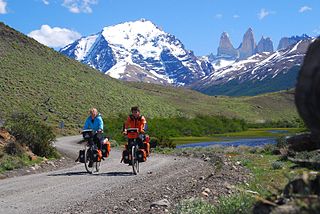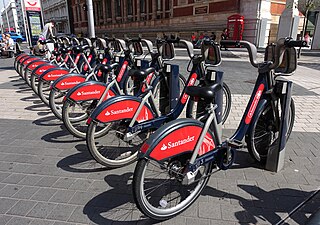
Bicycle touring is the taking of self-contained cycling trips for pleasure, adventure or autonomy rather than sport, commuting or exercise. Bicycle touring can range from single-day trips to extended travels spanning weeks or months. Tours may be planned by the participant or organized by a tourism business, local club or organization, or a charity as a fund-raising venture.
The Royal Society for the Prevention of Accidents (RoSPA) is a British charity that aims to save lives and prevent life-changing injuries which occur as a result of accidents. In the past, it has successfully campaigned on issues of road safety, including playing an integral role in the introduction of drink-drive legislation, the compulsory wearing of seatbelts and the ban on handheld mobile phones while driving, as well as on issues of occupational health and safety.

Sustrans is a United Kingdom-based walking, wheeling and cycling charity, and the custodian of the National Cycle Network.

NRMA is an Australian organisation offering roadside assistance, advocacy for motorists and road-users, motoring advice, car servicing, International Driving Permits, travel and other services in New South Wales and the Australian Capital Territory. It is a member-owned mutual company limited by guarantee. It was formed in 1920. The Headquarters is in Sydney Olympic Park, New South Wales, Australia.
Cycling UK is a trading name of the Cyclists' Touring Club (CTC), which is a charitable membership organisation supporting cyclists and promoting bicycle use. Cycling UK is registered at Companies House as "Cyclists’ Touring Club", and is covered by company law. It works at a national and local level to lobby for cyclists' needs and wants, provides services to members, and organises local groups for local activism and those interested in recreational cycling. The original Cyclists' Touring Club began in the nineteenth century with a focus on amateur road cycling but these days has a much broader sphere of interest encompassing everyday transport, commuting and many forms of recreational cycling. Prior to April 2016, the organisation operated under the brand "CTC, the national cycling charity". As of February 2020, the organisation's president is the newsreader Jon Snow.

London Councils is the local government association for Greater London, England. It is a cross-party organisation that represents London's 32 borough councils and the City of London. It was formed in 1995 as a merger of the London Boroughs Association and the Association of London Authorities. In April 2000 it gained further functions as strategic local government in London was reorganised. London Councils is a think tank and lobbying organisation, and also provides some services directly through legislation that allows multiple local authorities to pool responsibility and funding. London Councils is based at 59½ Southwark Street.

Bicycle Network is an Australian charity, one of the largest cycling membership organisations in the world, whose mission is to have More People Cycling More Often. Before 2011 it was known as Bicycle Victoria.
The Caravan and Motorhome Club is an organisation representing caravan and motorhome users in the United Kingdom and Ireland. It was founded in 1907 and now represents nearly one million members.

A cycling club is a society for cyclists. Clubs tend to be mostly local, and can be general or specialised. In the United Kingdom, for example, the Cyclists' Touring Club, (CTC) is a national cycling association; the Tricycle Association, Tandem Club and the Veterans Time Trial Association, for those over 40, are specialist clubs. Members of specialist or national groups often also belong to local clubs.

Cycling advocacy consists of activities that call for, promote or enable increased adoption and support for cycling and improved safety and convenience for cyclists, usually within urbanized areas or semi-urban regions. Issues of concern typically include policy, administrative and legal changes ; advocating and establishing better cycling infrastructure ; public education regarding the health, transportational and environmental benefits of cycling for both individuals and communities, cycling and motoring skills; and increasing public and political support for bicycling.
The Slower Speeds Initiative is a UK single issue coalition pressure group. It is an unincorporated association, controlled by its management committee, made up of representatives of its founder organisations. Its aims are "to raise awareness of the consequences of inappropriate speeds of road vehicles, to stimulate and contribute to the discussion on vehicle speeds and means of reducing inappropriate speeds and to achieve changes in government policy, driver behaviour and other relevant areas to reduce speeds".

The British Horse Society (BHS) is a membership-based equine charity, with a stated vision of "a Society which provides a strong voice for horses and people and which spreads awareness through support, training and education". It currently has more than 110,000 members, with a further 34,000 members affiliated through a British Riding Club, making it the largest equine membership organisation in the United Kingdom. It is one of the 19 organisations which form part of the British Equestrian Federation.

Cycling in London is a popular mode of transport and leisure activity within the capital city of the United Kingdom. Following a national decline in the 1960s of levels of utility cycling, cycling as a mode of everyday transport within London began a slow regrowth in the 1970s. This continued until the beginning of the 21st century, when levels began to increase significantly—during the period from 2000 to 2012, the number of daily journeys made by bicycle in Greater London doubled to 580,000. The growth in cycling can partly be attributed to the launch in 2010 by Transport for London (TfL) of a cycle hire system throughout the city's centre. By 2013, the scheme was attracting a monthly ridership of approximately 500,000, peaking at a million rides in July of that year. Health impact analyses have shown that London would benefit more from increased cycling and cycling infrastructure than other European cities.
The National Association of Local Councils (NALC) is a membership organisation and the only national body representing the interests of local councils. NALC works in partnership with county associations to support, promote and improve local councils.

Spokes Canterbury is the main cycling advocacy group in Canterbury, New Zealand. It was established in November 1998, as a successor to the former Canterbury Cyclists' Association. Cycling Action Network is the parent organisation for Spokes Canterbury. It has about 900 members, including "everyday" cyclists, road cyclists and mountain bikers.

Santander Cycles is a public bicycle hire scheme in London in the United Kingdom. The scheme's bicycles are popularly and colloquially known as Boris Bikes, after Boris Johnson who was Mayor of London when the scheme began operating.

Barry Mason was an activist for cycling in London. After graduating from the London School of Economics, his career included two years as head of visitor services at Salisbury Cathedral and four years working in Liverpool. In his later years he supported community and environmental projects in Southwark, South London. For a time he managed school building projects for Southwark Council, then became manager of Surrey Docks Farm.
Ilkley Cycling Club is a community-based club that promotes cycling in the town of Ilkley, West Yorkshire, United Kingdom.

Pedals is a voluntary organisation founded in 1979 to encourage more people to use bicycles and to campaign for safer and more attractive conditions for cyclists in the Nottingham area. Pedals campaigned to get Nottingham one of the country's largest network of urban cycle routes in the 1980s. It continues to press for many more facilities, especially in and across the City Centre and the north side of Nottingham, as well as linking better to nearby countryside.













